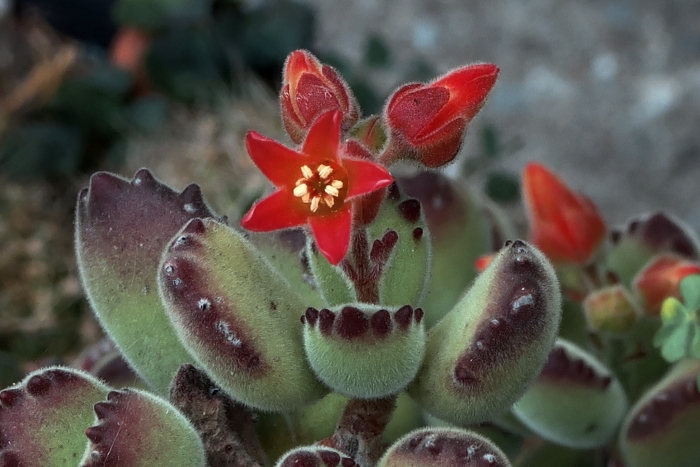Bear’s Paw
(Cotyledon tomentosa)
Bear’s Paw (Cotyledon tomentosa)
/
/

John Rusk from Berkeley, CA, United States of America
CC BY 2.0
Image By:
John Rusk from Berkeley, CA, United States of America
Recorded By:
Copyright:
CC BY 2.0
Copyright Notice:
Photo by: John Rusk from Berkeley, CA, United States of America | License Type: CC BY 2.0 | License URL: https://creativecommons.org/licenses/by/2.0 | Uploader: Tillman | Publisher: Wikimedia Commons | Title: Cotyledon_tomentosa_Berkeley_CA_.jpg | Notes: User created page with UploadWizard |





















Estimated Native Range
Summary
Cotyledon tomentosa, commonly known as Bear’s Paw, is an evergreen succulent native to the rocky outcrops and slopes of the Eastern Cape Province in South Africa. It is a low-growing plant, typically reaching a height of 0.4 feet (0.1 meters) and spreading up to 2 feet (0.6 meters) wide. Bear’s Paw is characterized by its distinctive, fuzzy, green leaves that resemble a bear’s paw, with reddish tooth-like markings on the edges. It produces bell-shaped yellow and orange flowers in late spring to early summer, which are moderately showy and attract pollinators.
Bear’s Paw is valued for its unique foliage and is often used in container gardens, rock gardens, and as a houseplant. It is appreciated for its ease of maintenance and drought tolerance. In cultivation, it requires a well-draining soil mix and should be watered thoroughly only when the soil is completely dry. Overwatering, especially in winter, can be detrimental. It prefers bright light and ample airflow to thrive. While it is dormant in summer, it is sensitive to frost and must be protected to prevent scarring of the leaves.CC BY-SA 4.0
Bear’s Paw is valued for its unique foliage and is often used in container gardens, rock gardens, and as a houseplant. It is appreciated for its ease of maintenance and drought tolerance. In cultivation, it requires a well-draining soil mix and should be watered thoroughly only when the soil is completely dry. Overwatering, especially in winter, can be detrimental. It prefers bright light and ample airflow to thrive. While it is dormant in summer, it is sensitive to frost and must be protected to prevent scarring of the leaves.CC BY-SA 4.0
Plant Description
- Plant Type: Succulent
- Height: 1-2 feet
- Width: 1-1.5 feet
- Growth Rate: Slow
- Flower Color: Yellow, Orange
- Flowering Season: Summer
- Leaf Retention: Evergreen
Growth Requirements
- Sun: Full Sun, Part Shade
- Water: Very Low, Low
- Drainage: Fast, Medium
Common Uses
Drought Tolerant, Fire Resistant, Groundcover, Low Maintenance, Potted Plant, Rock Garden, Showy Flowers
Natural Habitat
Rocky outcrops and slopes of the Eastern Cape Province in South Africa
Other Names
Common Names: Kitten Paws, Woolly Cotyledon
Scientific Names: , Cotyledon tomentosa, Cotyledon ladismithensis,
GBIF Accepted Name: Cotyledon tomentosa Harv.